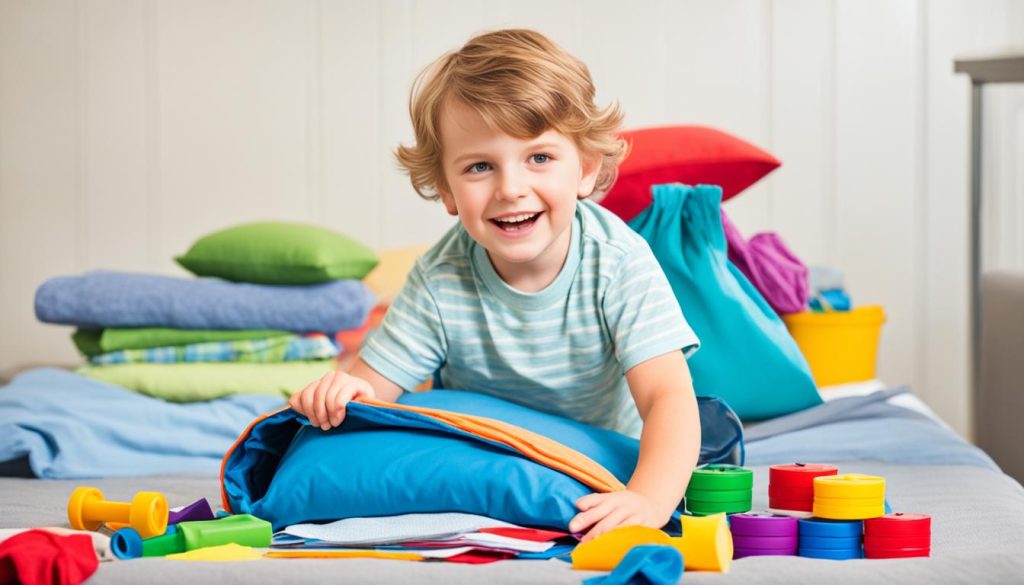Every parent wants the best for their child. But, parenting comes with challenges and uncertainties. Imagine seeing your child go through tough times, carrying more than they should. You might wonder how to help your child’s mental health and make sure they’re okay emotionally.
It’s crucial to spot early signs of mental health issues and create a supportive space. Data shows that supported kids can better handle life’s ups and downs. But, it’s not always easy. Changes in behavior can mean your child is struggling with something deeper.
Talking openly is key. When kids feel safe to share their feelings, they’re more likely to come to you with problems. Having a routine and clear rules can also help reduce stress and anxiety. This makes a safe space where your child feels important and loved.
Being positive and encouraging boosts their self-esteem. It makes them feel proud and confident. Supporting their mental health means looking after their physical health too. Encouraging them to be active is crucial for their growth.
If you’re worried, think about getting professional help. Registered dietitian Madeline Radigan Langham says mixing physical and emotional health is important. Getting help from places like the Discovery Mood & Anxiety Program shows you care. Between 2016 and 2020, more kids were diagnosed with anxiety and depression. Knowing this can help you act fast.
Key Takeaways
- Supporting your child’s mental health is vital for their overall development.
- Open communication increases trust and allows children to share issues more freely.
- Providing a routine and clear boundaries can reduce anxiety and stress.
- Positive feedback enhances children’s self-esteem and confidence.
- Encouraging physical activity and seeking professional help when needed are key components of mental well-being.
Understanding Child Mental Health
Child mental health covers their thoughts, coping skills, behaviors, and managing feelings at different ages. It’s as important as their physical health for their growth.

What is Mental Health?
Mental health in kids is about their thinking and feelings. Issues can cause delays or make it hard for them to behave and Child Social Skills Development. Conditions like anxiety, depression, or ADHD can make it tough for them to act normally.
Family life affects a child’s mental health a lot. Being poor, not talking well with parents, or having parents who use substances can make kids more at risk. Helping kids develop a Growth Mindset for Kids is key to building resilience and good mental health.
Differences Between Physical and Mental Health
Physical health is about growing and getting better from sickness. Mental health is about how kids think, feel, and act. Parents should watch for signs like lasting sadness, being easily annoyed, or trouble with Managing Child Tantrums.
Things that help kids stay mentally healthy include a caring family, doing well in school, feeling good about themselves, and being able to handle problems. But, kids in tough family situations, with parents who have mental health issues or are aggressive, are more likely to have mental health problems.
| Risk Factors | Protective Factors |
|---|---|
| Parental mental illness | Warm and supportive relationship with parents |
| Single-parent families | Support from family members |
| Parental substance abuse | Positive peer relationships |
| Poverty and marital difficulties | Healthy engagement with adults outside the home |
For kids to be mentally healthy, we need to look at both what can hurt and help them. Creating caring environments and teaching mental toughness can really help parents deal with mental health issues.
Modeling Healthy Coping Skills
Role-modeling is key in parenting. By showing healthy ways to deal with feelings and stress, you can greatly affect your child’s behavior and emotional skills. Parents are crucial in teaching kids to be independent, develop good habits, and learn for life. By acting and talking about these habits, kids can learn and use them in their own lives.

Practicing Deep Breathing and Relaxation Techniques
Teaching kids deep breathing and relaxation is a strong way to help them handle stress. Using these skills often can make them less impulsive and help calm down conflicts. When kids see you doing this, they learn the value and how to stay calm. Plus, explaining why you do it can make them understand and act more on their own.
Engaging in Physical Activities Together
Doing physical activities together is key for both mental and physical health. Things like walking, biking, or sports not only keep the body healthy but also let you talk about feelings and relationships. This helps kids develop good habits and brings the family closer, making the parent-child bond stronger. It also encourages kids to keep learning and embracing physical activity and healthy ways to cope.
Building Self-Esteem in Children
Building self-esteem in children is key to their growth. It means always encouraging them, setting achievable goals, and celebrating their hard work. This helps boost their confidence and prepares them to overcome life’s hurdles with strength. By supporting their creativity and valuing their efforts, we help grow their creativity and self-esteem.

Encouraging and Praising Efforts
It’s important to praise what children do, not just what they achieve. Focusing on their strengths makes them feel proud. By celebrating their efforts, we teach them the value of hard work and perseverance. These are key to building resilience in kids.
- Recognize and celebrate their efforts and hard work.
- Encourage healthy friendships to build a supportive environment.
- Practice gratitude by mentioning at least three positive things each day.
- Involve them in helping others to enhance their self-esteem.
Setting Realistic Goals
Setting and reaching realistic goals is vital for self-esteem. Teach kids to aim for goals they can achieve and show them it’s okay to make mistakes. This teaches them that failures are temporary and encourages them to keep trying.
“Trial and error is crucial for children’s learning, as it helps them understand that setbacks are not fatal and encourages greater effort.”
Letting kids explore their interests and learn new skills helps them find their identity and gain confidence. This builds their self-worth and prepares them for challenges. Also, mixing challenges with successes helps them feel secure in facing difficulties.
Positive Parenting Strategies
Positive parenting is key to raising emotionally healthy kids. It means giving them unconditional love and creating a caring space for them to grow. This style helps kids do well in school, feel emotionally stable, and handle tough times better.

Providing Unconditional Love
When kids feel loved no matter what, they do great. Parents show this love by listening to them, supporting them when they’re down, and celebrating who they are. It’s also important to let them be independent. They should know they can safely come back home.
Showing warmth and affection helps kids behave better and do well in school. This kind of love is powerful.
Creating a Safe and Secure Environment
A safe home is crucial for kids’ mental health. It should have the right mix of guidance and freedom. This lets kids follow their interests and stick to family values.
Teaching kids to be grateful makes them feel more secure and thankful for what they have. Having routines and being consistent helps kids know what’s expected. This makes them feel more in charge of their world.
Having a strong parent-child bond is key for kids to be emotionally strong and stable. The Positive Parenting Research Team found that positive parenting has big benefits. It leads to better behavior and fewer problems over time.
Studies show that positive parenting techniques like emotion coaching can improve kids’ positive behaviors and well-being by 79%.
By working on strengthening parent-child bonds, creating a supportive environment, and using positive parenting, you can give your child a caring and supportive upbringing.
Importance of Open Communication
Talking openly with your child is key to a strong bond. When kids feel heard and understood, they do better overall. Studies say about 70% of good parent-child relationships come from talking well.
Listening Actively
Listening well is a big part of talking openly. It shows your child you value their thoughts and feelings. This makes them feel more valid.
After trying active listening, 80% of parents say they connect better with their kids. It helps in teaching your child right from wrong and builds trust and understanding.
Encouraging Emotional Expression
Letting your child share their feelings is important too. When parents validate their kids, 75% feel more loved and accepted. This helps kids deal with their feelings in a healthy way and creates a supportive home.
Showing empathy makes the bond between parents and kids stronger. When parents show they care, 85% feel closer and more trusting with their kids. This is key in managing sibling rivalry. It makes sure all kids feel heard and valued, leading to a peaceful family.
Parent-Child Communication
Talking well with your kids is key to building respect and empathy in your family. It helps everyone understand each other better and keeps screen time in check. Using special ways to talk can make this even better.
Effective Communication Techniques
Using eye contact and really listening to your kids can really help teach them manners. When you ask them open-ended questions and listen well, they feel important. This builds respect in your family. Also, speaking in a way they can understand makes your messages clearer.
- Listen Actively – Listening well makes your kids feel important.
- Make Eye Contact – It shows you’re really paying attention.
- Use Open-Ended Questions – This helps your kids share more about their feelings and thoughts.
- Eliminate Distractions – Setting times without screens helps keep conversations clear.
Barriers to Communication
Even when we try hard, some things can get in the way of good talks. Things like old ideas and distractions, like screens, can break up conversations. To fix this, make screen-free areas or times. Also, dealing with family stress and using positive parenting helps improve talks.
“Children with parents who communicate well are more likely to listen and follow rules.”
Knowing these obstacles and working to overcome them teaches kids good manners. It also builds a respectful and empathetic family. This makes for happier kids and better family bonds.
Setting Boundaries with Kids
Teaching kids about responsibility starts with setting boundaries. Using effective discipline and a structured environment helps them grow. It’s about being firm yet flexible, which is key for good routines and fair consequences. This balance helps kids learn to behave responsibly, making life easier for parents.
Establishing a Routine
For kids, having a daily routine is key. It makes them feel secure by being predictable. This is especially important for balancing work and family life.
- Morning & Nighttime Routines: Being consistent helps kids start and end their days well.
- Mealtime Consistency: Regular meal times make things stable for kids.
- Homework & Playtime: Setting aside specific times for homework and play keeps things balanced.
Enforcing Consequences Consistently
Effective discipline means showing kids how their actions affect their outcomes. Being consistent with consequences teaches them responsibility and respects the set boundaries.
“Consistency breeds trust. When children understand that boundaries are maintained and consequences are enforced fairly, they feel secure in their environment.”
It’s important to explain the reasons behind the rules to your kids. This helps them understand and follow the rules better.
| Aspect | Approach |
|---|---|
| Physical Boundaries | Teach personal space and respect for others’ bodies. |
| Mealtimes & Bedtimes | Enforce consistent schedules to improve behavior and well-being. |
| Positive Reinforcement | Encourage good behavior with specific praises. |
Using these strategies creates a caring environment where boundaries help guide, not limit. This approach supports balancing work and family life. Remember, setting boundaries with love and understanding helps kids grow and thrive.
Recognizing Signs of Mental Health Issues
It’s key to spot mental health issues in kids early. Kids might face anxiety, ADHD, autism, eating disorders, depression, PTSD, or schizophrenia. Catching these problems early can really help their growth. Look out for sadness over two weeks, changes in how they act with others, self-harm, big mood changes, or eating and sleeping issues.
Knowing when to get help is vital. Here’s a table with signs and what to do next:
| Warning Signs | Recommended Action |
|---|---|
| Sadness lasting more than two weeks | Consult a mental health professional |
| Drastic changes in eating or sleeping habits | Schedule a complete medical exam |
| Self-harm or talk of suicide | Immediate intervention required |
| Severe mood swings | Behavioral observation and mental health tests |
| Social withdrawal | Family and individual counseling |
Child nutrition and development affect mental health too. Bad eating can make mental health worse, but good food helps. Doctors check for mental health issues with exams, looking at the family history, and watching behavior. Treatment might be talk therapy or the right medicine like stimulants or antidepressants.
Many parents don’t get help because of stigma, cost, or access issues. But, if your child shows signs of mental illness, get help. About 10%-15% of kids need help because their behavior changes a lot.
Parents are key in helping kids with mental health. They can help with treatment plans, family therapy, and make sure schools support their child. Spotting serious mental health issues early and getting help can really change a child’s life.
Conclusion
Parenting with a focus on mental health is a journey that’s both proactive and loving. It’s more than just fixing problems as they come. By understanding child mental health, you can create a supportive environment. This environment helps with emotional intelligence, resilience, and healthy communication.
Statistics show that 65% of parents see the importance of spending quality time with their kids for mental health. This shows how crucial *Strengthening Parent-Child Bond* through regular, meaningful talks is.
Open communication is key; 72% of parents say it’s vital for a strong relationship. Letting your kids share their feelings freely, as 48% of parents do, helps a lot with their mental health. *Positive Reinforcement Parenting* is also key. It’s about praising their efforts and successes, which boosts their self-esteem and positive self-image.
Play is vital for kids’ growth, both in thinking and feeling. It also helps strengthen your bond with them. Studies show that being a good parent shapes traits like being conscientious and agreeable. Parenting deeply affects a child’s life, offering chances for growth, discovery, and learning.
To use these methods, you need to be attentive, consistent, and mindful. Aim for a balance between discipline and giving your child space, something 56% of parents want. As you keep going, always look for ways to improve your approach. This will help your child’s mental health and growth.
FAQ
What is Mental Health?
What are the Differences Between Physical and Mental Health?
How Can I Practice Deep Breathing and Relaxation Techniques with My Child?
What Are the Benefits of Engaging in Physical Activities Together?
How Can I Encourage and Praise My Child’s Efforts?
Why Is It Important to Set Realistic Goals for My Child?
How Can I Provide Unconditional Love to My Child?
How Do I Create a Safe and Secure Environment for My Child?
What Are Techniques for Listening Actively to My Child?
How Can I Encourage Emotional Expression in My Child?
What Are Effective Communication Techniques with Children?
What Are Common Barriers to Communication with Children?
How Can I Establish a Routine for My Child?
Why Is it Important to Enforce Consequences Consistently?
How Can I Recognize Signs of Mental Health Issues in My Child?
When Should I Seek Professional Help for My Child’s Mental Health?
This post contains affiliate links. If you click on a link and make a purchase, I may earn a small commission — at no extra cost to you. Thank you for supporting this blog and helping me keep the patterns free! Read the full Affiliate Disclosure & Transparency.
